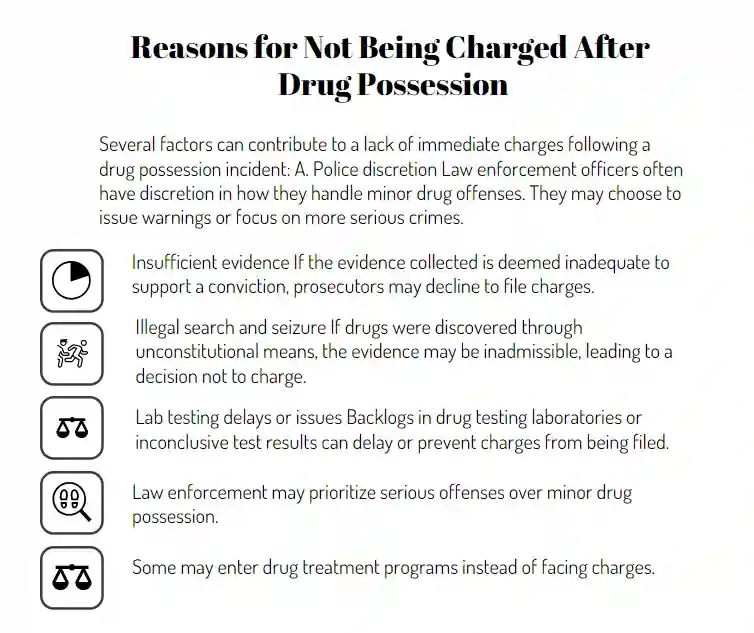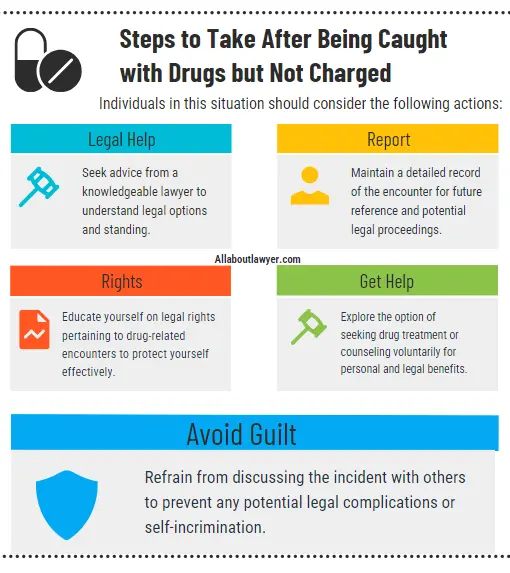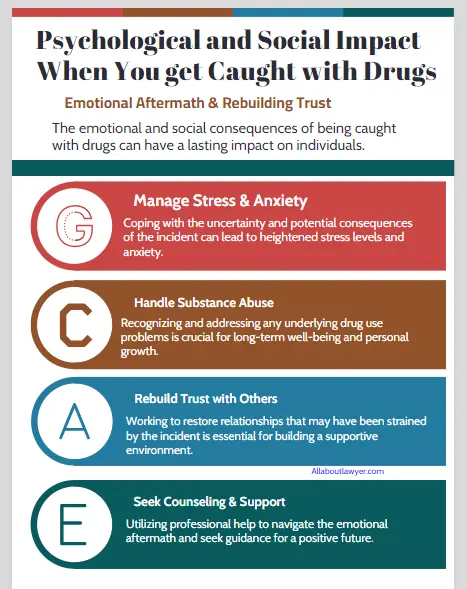Caught with Drugs but Not Charged Situation and Legal Options
Drug possession incidents are common occurrences in the criminal justice system. These situations involve individuals being found with controlled substances, potentially leading to legal consequences. However, not all incidents result in formal charges, creating a unique legal scenario for those involved. So in this article we will discuss what was the reason when you get Caught with Drugs but Not Charged.
Table of Contents
The concept of being caught but not charged
Being caught with drugs but not charged refers to situations where law enforcement encounters an individual in possession of illegal substances, but formal criminal charges are not immediately filed. This limbo state can be confusing and stressful for those involved, as the threat of future legal action may still loom.
Reasons for Not Being Charged After Drug Possession
Several factors can contribute to a lack of immediate charges following a drug possession incident:
A. Police discretion
Law enforcement officers often have discretion in how they handle minor drug offenses. They may choose to issue warnings or focus on more serious crimes.
B. Insufficient evidence
If the evidence collected is deemed inadequate to support a conviction, prosecutors may decline to file charges.
C. Illegal search and seizure
If drugs were discovered through unconstitutional means, the evidence may be inadmissible, leading to a decision not to charge.
D. Lab testing delays or issues
Backlogs in drug testing laboratories or inconclusive test results can delay or prevent charges from being filed.
E. Prioritization of law enforcement resources
In some jurisdictions, minor drug possession may be a lower priority compared to more serious offenses.
F. Participation in drug diversion programs
Some individuals may be offered the opportunity to enter drug treatment programs in lieu of facing charges.

Legal Status When Caught With Drugs but Not Charged
The legal status of individuals caught with drugs but not charged can vary:
A. Pending investigation
Law enforcement may continue investigating before deciding whether to file charges.
B. Informal warnings
Officers might issue verbal or written warnings without initiating formal legal proceedings.
C. Conditional release
Some jurisdictions may release individuals on the condition that they seek treatment or meet other requirements.
D. Statute of limitations considerations
The time frame within which charges can be filed varies by jurisdiction and offense type.
Related Articles For You:
Is Verbal assault actually a crime?
Potential Consequences Despite Lack of Charges
Even without formal charges, being caught with drugs can have repercussions:
A. Future legal implications
The incident may be considered in future encounters with law enforcement.
B. Employment and background check issues
Some background checks may reveal the incident, potentially affecting employment opportunities.
C. Educational opportunities impact
College admissions or financial aid eligibility could be affected in some cases.
D. Housing application concerns
Rental applications may be impacted if the incident is disclosed or discovered.
E. Professional license implications
Certain professions may require disclosure of drug-related incidents, even without charges.
Steps to Take After Being Caught with Drugs but Not Charged
Individuals in this situation should consider the following actions:
A. Look For legal counsel

Consulting with an experienced attorney can provide clarity on one’s legal standing and options.
B. Documenting the incident
Keeping a detailed record of the encounter can be valuable for future reference.
C. Understanding your rights
Familiarizing oneself with legal rights in drug-related encounters is crucial.
D. Considering drug treatment or counseling
Voluntarily seeking help can be beneficial both personally and legally.
E. Avoiding self-incrimination
Refraining from discussing the incident with others to prevent potential legal complications.
Legal Options and Strategies
Several legal strategies may be available:
A. Proactive measures to prevent future charges
Working with an attorney to address any pending investigations or potential charges.
B. Sealing or expunging records (if applicable)
In some cases, it may be possible to seal or expunge records related to the incident.
C. Addressing potential civil asset forfeiture
Understanding and challenging any property seizures related to the drug incident.
D. Dealing with related administrative penalties
Addressing any administrative consequences, such as license suspensions.
Drug Diversion Programs and Alternatives to Prosecution
Many jurisdictions offer alternatives to traditional prosecution:
A. Types of diversion programs
These may include drug courts, treatment programs, or community service options.
B. Eligibility criteria
Understanding who qualifies for these programs and under what circumstances.
C. Program requirements and duration
Typical obligations and timeframes for completing diversion programs.
D. Benefits of successful completion
The advantages of completing these programs, including potential charge dismissal.
Understanding Drug Laws and Penalties
A comprehensive understanding of drug laws is crucial:
A. Federal vs. state drug laws
Recognizing the differences between federal and state drug regulations.
B. Possession vs. intent to distribute
Understanding how quantities and other factors influence potential charges.
C. Drug schedules and corresponding penalties
Familiarity with how different substances are classified and penalized.
D. Factors influencing charging decisions
Understanding what prosecutors consider when deciding whether to file charges.
Rights and Protections in Drug-Related Encounters
Knowing one’s rights is essential in drug-related situations:
A. Fourth Amendment protections
Understanding protections against unreasonable searches and seizures.
B. Miranda rights
Recognizing when these rights apply and how to invoke them.
C. Right to refuse searches
Understanding when and how to refuse consent for searches.
D. Importance of remaining silent
Recognizing the right to remain silent and its importance in legal proceedings.
Long-term Strategies for Avoiding Drug Charges
Developing strategies to prevent future incidents is crucial:
A. Understanding addiction and seeking help
Addressing underlying substance abuse issues through professional help.
B. Lifestyle changes to reduce risk
Making conscious choices to avoid situations that may lead to drug possession.
C. Knowing your rights in future encounters
Maintaining awareness of legal rights to navigate potential future incidents.
D. Community resources and support systems
Utilizing available resources for ongoing support and guidance.
Psychological and Social Impact When You get Caught with Drugs but Not Charged

The emotional and social consequences of being caught with drugs can be significant:
A. Dealing with stress and anxiety
Coping with the uncertainty and potential consequences of the incident.
B. Addressing substance abuse issues
Recognizing and addressing any underlying drug use problems.
C. Rebuilding trust with family and community
Working to restore relationships that may have been strained by the incident.
D. Look for support and counseling
Utilizing professional help to navigate the emotional aftermath.
Conclusion
A. Recap of key points
Summarizing the essential information covered in the article.
B. Importance of legal guidance and personal responsibility
Emphasizing the value of professional legal advice and individual accountability.
C. Moving forward positively after the incident
Encouraging a proactive approach to personal growth and legal compliance.
FAQs
Can I still be charged later if I wasn’t charged immediately?
Yes, charges can be filed later, subject to statute of limitations.
Will this incident show up on my criminal record?
It depends on the jurisdiction and specifics of the incident.
Should I voluntarily enter a drug treatment program?
This can be beneficial but consult with a lawyer before making decisions.
How long should I retain a lawyer after being caught but not charged?
It’s advisable to maintain legal counsel until the statute of limitations expires.
What should I do if contacted by law enforcement after the incident?
Consult with your attorney before responding to any law enforcement inquiries.
For more such informative article feel free to visit All About Lawyer Blog.
About the Author

Sarah Klein, JD, is a former criminal defense attorney with hands-on experience in cases involving DUIs, petty theft, assault, and false accusations. Through All About Lawyer, she now helps readers understand their legal rights, the criminal justice process, and how to protect themselves when facing charges.
Read more about Sarah
